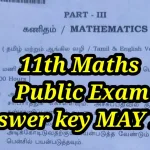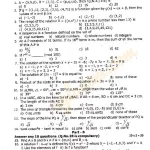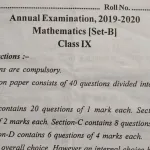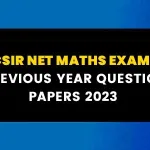Sample Questions and Answers:
What is the primary component of natural gas?
Answer: Methane is the primary component of natural gas.
How do you increase the solubility of a gas in a liquid?
Answer: Increasing the pressure increases the solubility of a gas in a liquid.
What causes rusting of iron?
Answer: Rusting of iron occurs when iron comes in contact with water and oxygen.
What is the pH level of distilled water?
Answer: The pH level of distilled water is about 7, which is neutral.
Describe the role of a catalyst in a chemical reaction.
Answer: A catalyst speeds up a chemical reaction without being consumed by the reaction itself.
What is the common name for sodium chloride?
Answer: The common name for sodium chloride is table salt.
What type of bond is found in sodium chloride?
Answer: Ionic bond is found in sodium chloride.
What are isotopes?
Answer: Isotopes are atoms of the same element that have different numbers of neutrons.
Why is the ozone layer important?
Answer: The ozone layer absorbs most of the sun’s harmful ultraviolet radiation.
What is the effect of an increase in temperature on the rate of a chemical reaction?
Answer: An increase in temperature generally increases the rate of a chemical reaction.
What is the main product of photosynthesis?
Answer: The main products of photosynthesis are glucose and oxygen.
What is the chemical formula for water?
Answer: The chemical formula for water is H2O.
What causes the blue color of the sky?
Answer: The blue color of the sky is caused by the scattering of sunlight by the atmosphere.
What is the process of converting a gas directly to a solid called?
Answer: The process is called deposition.
Name a common antioxidant found in many fruits and vegetables.
Answer: Vitamin C is a common antioxidant found in many fruits and vegetables.
What is the primary source of energy for the Earth’s climate system?
Answer: The primary source of energy for the Earth’s climate system is the sun.
Describe what is meant by a polar molecule.
Answer: A polar molecule has a partial positive charge on one side and a partial negative charge on the other side.
What gas do plants absorb from the environment to perform photosynthesis?
Answer: Plants absorb carbon dioxide from the environment to perform photosynthesis.
What is the purpose of refrigeration from a chemical standpoint?
Answer: Refrigeration slows down the chemical reactions occurring in perishable foods, thus delaying spoilage.
What type of chemical reaction occurs when you cook an egg?
Answer: The cooking of an egg involves a denaturation reaction, where proteins lose their structure due to heat.
What do acids release in water?
Answer: Acids release hydrogen ions (H+) in water.
What is the effect of catalysts on the activation energy of a chemical reaction?
Answer: Catalysts lower the activation energy of a chemical reaction.
What is the most abundant gas in the Earth’s atmosphere?
Answer: Nitrogen is the most abundant gas in the Earth’s atmosphere.
What is meant by the term ‘reversible reaction’?
Answer: A reversible reaction is a chemical reaction in which the products can re-form the original reactants.
What are the raw materials for the process of photosynthesis?
Answer: The raw materials for photosynthesis are carbon dioxide and water.
What does the law of conservation of mass state?
Answer: The law of conservation of mass states that mass is neither created nor destroyed in a chemical reaction.
Why does ice float in water?
Answer: Ice floats in water because it is less dense than liquid water.
Name a substance that sublimates at room temperature.
Answer: Dry ice, or solid carbon dioxide, sublimates at room temperature.
What is the common indicator used to test whether a substance is acidic or basic?
Answer: Litmus paper is a common indicator used to test if a substance is acidic or basic.
These questions cover basic concepts and principles of chemistry, tailored for understanding without the need for complex chemical notation.
Top Study Guides for Bihar Board Class 12 Chemistry 2019
-
Comprehensive Chemistry XII by Dr. N. K. Verma, S. K. Khanna, and B. Kapila – Laxmi Publications
Content: Detailed explanations of concepts, sample papers, and previous year question papers with solutions. -
Modern’s ABC of Chemistry for Class 12 by S. P. Jauhar – Modern Publishers
Content: Provides a conceptual approach to the chemistry syllabus with practice questions and model test papers. -
Pradeep’s New Course Chemistry for Class 12 by S.C. Kheterpal and S.N. Dhawan – Pradeep Publications
Content: In-depth topic discussion, solved examples, and questions from previous Bihar board exams. -
U-Like Chemistry for Class 12 – U-Like Publications
Content: Sample papers with model solutions and last minute revision tips based on the Bihar board pattern. -
Together with Chemistry for Class 12 – Rachna Sagar Publications
Content: Comprehensive theory followed by practice exercises and previous years’ solved papers. -
Target Chemistry XII by P. Bahadur – Target Publications
Content: Focuses on problem-solving techniques and includes a collection of previous years’ board questions. -
New Simplified Chemistry Class 12 by Dr. Viraf J. Dalal – Allied Publishers
Content: Simplified text with a clear explanation of concepts and multiple-choice questions for self-assessment. -
Golden Chemistry XII by N. K. Aggarwal – New Age International Publishers
Content: Easy to understand text with diagrams, solved problems, and practice papers. -
CBSE Chapterwise Solved Papers Chemistry Class 12 for Bihar Board by Arihant Experts – Arihant Publications
Content: Compilation of solved previous CBSE board papers adaptable for Bihar Board, including important derivations and numericals. -
Chemistry XII: NCERT-Based Objective Questions by Dr. Ajay Taneja – Arihant Publications
Content: Objective questions based on NCERT textbook that are helpful for Bihar board students to prepare for multiple-choice question exams. -
Oswaal Bihar Board Chapterwise & Topicwise Solved Papers, Chemistry Class 12 – Oswaal Books
Content: Chapterwise and topicwise presentation of previous year solved papers with easy explanations. -
Chemistry Formulae & Definitions Handbook Class 12 by R. P. Manchanda – S. Chand Publications
Content: Handy guide for quick revision of formulas and definitions, perfect for last-minute study. -
Concepts of Organic Chemistry for Class 12 by OP Tandon – GRB Publications
Content: Detailed discussion on organic chemistry concepts, reactions, and mechanisms with questions for practice. -
A Textbook of Physical Chemistry for Class 12 by K. L. Kapoor – Macmillan Publishers
Content: Focuses on physical chemistry with theoretical explanations and numerical problems. -
Bihar Board Exam Special Chemistry Class 12 by Expert Panel – Upkar Prakashan
Content: Tailored for Bihar Board with focus on frequently asked questions and concepts. -
Advanced Problems in Chemistry for Bihar Board Class 12 by Vikas Jain – Arihant Publications
Content: Designed for higher-level problem solving, ideal for students aiming for competitive exams post-12th. -
Exam Ready Series for Chemistry XII by Dr. R. R. Misra – Bharati Bhawan Publishers
Content: Focus on exam preparation with summaries, MCQs, and previous year papers. -
Essential Chemistry for Class 12 by Ranjeet Shahi – Arihant Publications
Content: Comprehensive coverage with a focus on NCERT syllabus, including quick revision tips and typical exam questions. -
Systematic Approach to Chemistry Class 12 by H. C. Srivastava – S. Chand Publications
Content: Systematic approach in explaining concepts with solved and unsolved problems to boost preparation. -
Self Master of Chemistry Class 12 by D. B. Singh – Bharati Bhawan Publishers
Content: Includes extensive exercises and worked examples to master the subject effectively.
Navigating the complexities of the Bihar Board 12th Chemistry exam can be daunting, but with the right strategies and insights, students can tackle the 2019 question paper with confidence. This article provides an overview of what to expect from the exam and expert recommendations on how to prepare effectively.
The Bihar Board Class 12 Chemistry examination tests a range of topics including Organic, Inorganic, and Physical Chemistry. The 2019 paper followed a pattern consistent with these sections, focusing on both theoretical knowledge and practical applications. It is essential for students to not only understand chemical concepts but also to apply them to solve various types of questions that might include direct questions, numerical problems, and scenario-based inquiries.
First and foremost, mastering the Bihar Board chemistry syllabus is crucial. Students should ensure they cover all topics outlined in the syllabus, as the exam will comprehensively test each area. Topics such as Chemical Kinetics, Electrochemistry, and Coordination Compounds often carry more weight and require a deeper understanding and practice.
To prepare for the 2019 question paper, one effective strategy is to solve previous years’ papers and sample papers. This practice not only helps in understanding the exam pattern and types of questions but also aids in time management skills, a critical component during exams. Timing each practice session can simulate actual exam conditions, helping students to manage their exam time more efficiently.
Another recommendation from chemistry educators is to focus on conceptual clarity. Chemistry in Class 12 involves many concepts that build upon each other. A strong grasp of fundamental concepts like atomic structure, chemical bonding, and thermodynamics can make tackling complex questions much easier. For this, students may use a variety of study resources such as textbooks, reference books, and online tutorials that provide detailed explanations and additional practice.
Visual aids like charts, diagrams, and flowcharts are invaluable tools for visual learners. These aids can help in memorizing processes like the mechanism of reactions and periodic trends more effectively. Regularly revising these aids can reinforce understanding and aid in quick recall during the examination.
For numerical problems in Physical Chemistry, regular practice is key. Students should focus on solving various numericals to get comfortable with calculations and formula applications. It’s important to understand the underlying principles behind each calculation, as this will aid in solving similar problems with different variables.
Group study sessions can also be beneficial when preparing for the Chemistry exam. Discussing topics with peers can provide new insights and expose students to different methods of solving a problem. Moreover, teaching a concept to someone else is a great way to reinforce one’s own understanding.
Lastly, students should not ignore the importance of mock tests. Taking regular mock tests can help gauge preparation levels and identify weak areas. This feedback is crucial for making the final adjustments to the study plan leading up to the exam.
In summary, success in the Bihar Board 12th Chemistry exam requires a balanced approach that includes thorough understanding of the syllabus, consistent practice, and strategic revision. By focusing on these areas, students can enhance their preparation and aim to achieve excellent results in their Chemistry exams. Remember, the goal is to not just memorize but to understand and apply concepts effectively.
FAQ for Bihar Board 12th Chemistry Question Paper 2019
What was the overall difficulty level of the Bihar Board 12th Chemistry paper 2019?
The paper was of moderate difficulty. It had a balanced mix of conceptual, numerical, and memory-based questions.
Was the 2019 Chemistry paper based entirely on the NCERT syllabus?
Yes, the question paper was strictly based on the NCERT syllabus prescribed by the Bihar School Examination Board (BSEB).
How many sections were there in the Chemistry paper?
The paper was divided into multiple sections, usually including objective (MCQs), short answer, and long answer questions.
Were there any numerical-based questions in the 2019 Chemistry paper?
Yes, numerical questions were included, especially from Physical Chemistry topics like Electrochemistry and Chemical Kinetics.
What chapters carried the most weight in the 2019 exam?
Chapters like Electrochemistry, Organic Chemistry – Alcohols, Phenols and Ethers, and Coordination Compounds were heavily weighted.
Did the paper include multiple-choice questions?
Yes, there was an objective section that included multiple-choice questions, mostly at the beginning of the paper.
What was the time duration for completing the Chemistry paper?
The total time allotted for the paper was 3 hours.
Was there any choice given in the questions?
Yes, students had internal choices in both short and long answer sections to select from alternative questions.
How important is solving the 2019 paper for current students?
Practicing the 2019 question paper helps students understand the format, types of questions asked, and important topics to focus on.
Is the 2019 Chemistry question paper useful for board exam revision?
Absolutely, it serves as a great resource for revision and mock practice close to the exam date.
Were HOTS (Higher Order Thinking Skills) questions included in the 2019 paper?
Yes, a few HOTS questions were included that tested the analytical and application-based understanding of students.
Can I score well by just studying previous year papers like 2019?
Previous papers help a lot but should be combined with full syllabus coverage and conceptual understanding for best results.
Was the 2019 paper tougher than the previous years?
The difficulty level was on par with previous years, with a few tricky questions in Physical Chemistry.
Which section in the 2019 paper was considered the easiest?
Most students found the Organic Chemistry section easier compared to others.
Is there any negative marking for incorrect answers in the objective section?
No, the Bihar Board does not have negative marking for incorrect answers in board exams.
Do toppers recommend solving the 2019 Chemistry paper?
Yes, toppers often recommend going through the 2019 and other recent papers to strengthen exam preparation.
How many marks was the Chemistry theory paper in 2019?
The theory paper was for 70 marks, and 30 marks were allotted for practical exams.
Was the marking scheme clearly defined in the 2019 paper?
Yes, each question had clear marking, and word limits were also mentioned for subjective answers.
What kind of preparation is needed to solve such papers confidently?
A mix of NCERT textbook study, concept clarity, regular practice of previous year papers, and mock tests is essential.
Latest Posts
- Step-by-step guide to download and apply for jee mains admit card 202
- Comprehensive 2025 government holidays and recruitment details for job seekers
- JEE Mains Admit Card 2025: Your Step-by-Step Guide to Downloading the Hall Ticket
- Everything You Need to Know About 2025 Government Holidays Recruitment
- Comprehensive Guide to rrb d group recruitment 2025 – Eligibility, Vacancies, and Application
- Detailed guide to nps trust recruitment 2025 vacancies, eligibility and apply process
- Comprehensive guide to hpcl recruitment 2025 notification, vacancies, and application process
- ignou bed admission 2025 complete recruitment guide with eligibility and process
- Comprehensive Guide to Indian Army Agniveer Recruitment 2025 Notification and Jobs
- Everything You Must Know About CBSE Board Exams 2025 Changes & New Rules






